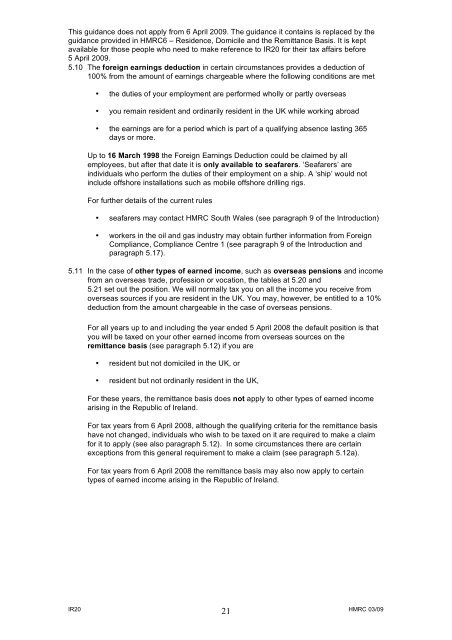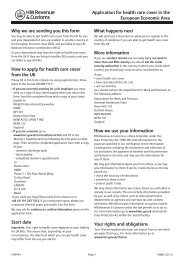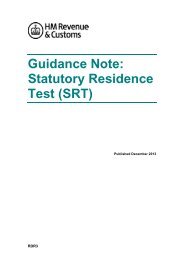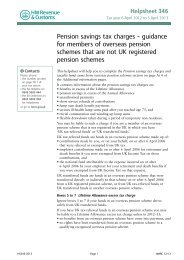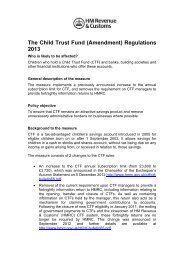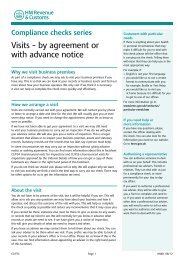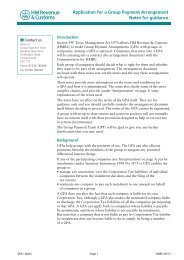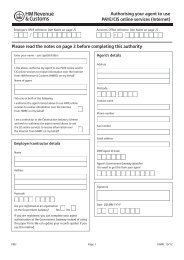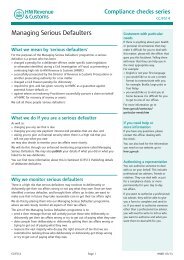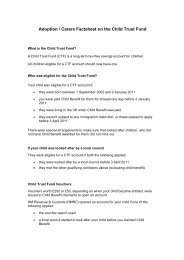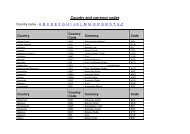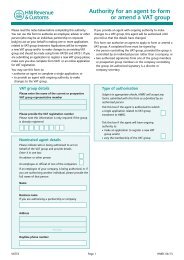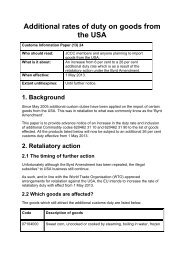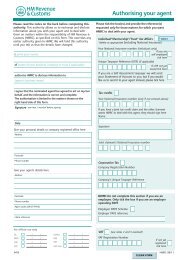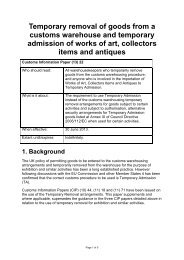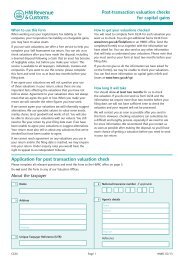IR20 - Residents and non-residents liability to tax in the United ...
IR20 - Residents and non-residents liability to tax in the United ...
IR20 - Residents and non-residents liability to tax in the United ...
You also want an ePaper? Increase the reach of your titles
YUMPU automatically turns print PDFs into web optimized ePapers that Google loves.
This guidance does not apply from 6 April 2009. The guidance it conta<strong>in</strong>s is replaced by <strong>the</strong><br />
guidance provided <strong>in</strong> HMRC6 – Residence, Domicile <strong>and</strong> <strong>the</strong> Remittance Basis. It is kept<br />
available for those people who need <strong>to</strong> make reference <strong>to</strong> <strong>IR20</strong> for <strong>the</strong>ir <strong>tax</strong> affairs before<br />
5 April 2009.<br />
5.10 The foreign earn<strong>in</strong>gs deduction <strong>in</strong> certa<strong>in</strong> circumstances provides a deduction of<br />
100% from <strong>the</strong> amount of earn<strong>in</strong>gs chargeable where <strong>the</strong> follow<strong>in</strong>g conditions are met<br />
• <strong>the</strong> duties of your employment are performed wholly or partly overseas<br />
• you rema<strong>in</strong> resident <strong>and</strong> ord<strong>in</strong>arily resident <strong>in</strong> <strong>the</strong> UK while work<strong>in</strong>g abroad<br />
• <strong>the</strong> earn<strong>in</strong>gs are for a period which is part of a qualify<strong>in</strong>g absence last<strong>in</strong>g 365<br />
days or more.<br />
Up <strong>to</strong> 16 March 1998 <strong>the</strong> Foreign Earn<strong>in</strong>gs Deduction could be claimed by all<br />
employees, but after that date it is only available <strong>to</strong> seafarers. ‘Seafarers’ are<br />
<strong>in</strong>dividuals who perform <strong>the</strong> duties of <strong>the</strong>ir employment on a ship. A ‘ship’ would not<br />
<strong>in</strong>clude offshore <strong>in</strong>stallations such as mobile offshore drill<strong>in</strong>g rigs.<br />
For fur<strong>the</strong>r details of <strong>the</strong> current rules<br />
• seafarers may contact HMRC South Wales (see paragraph 9 of <strong>the</strong> Introduction)<br />
• workers <strong>in</strong> <strong>the</strong> oil <strong>and</strong> gas <strong>in</strong>dustry may obta<strong>in</strong> fur<strong>the</strong>r <strong>in</strong>formation from Foreign<br />
Compliance, Compliance Centre 1 (see paragraph 9 of <strong>the</strong> Introduction <strong>and</strong><br />
paragraph 5.17).<br />
5.11 In <strong>the</strong> case of o<strong>the</strong>r types of earned <strong>in</strong>come, such as overseas pensions <strong>and</strong> <strong>in</strong>come<br />
from an overseas trade, profession or vocation, <strong>the</strong> tables at 5.20 <strong>and</strong><br />
5.21 set out <strong>the</strong> position. We will normally <strong>tax</strong> you on all <strong>the</strong> <strong>in</strong>come you receive from<br />
overseas sources if you are resident <strong>in</strong> <strong>the</strong> UK. You may, however, be entitled <strong>to</strong> a 10%<br />
deduction from <strong>the</strong> amount chargeable <strong>in</strong> <strong>the</strong> case of overseas pensions.<br />
For all years up <strong>to</strong> <strong>and</strong> <strong>in</strong>clud<strong>in</strong>g <strong>the</strong> year ended 5 April 2008 <strong>the</strong> default position is that<br />
you will be <strong>tax</strong>ed on your o<strong>the</strong>r earned <strong>in</strong>come from overseas sources on <strong>the</strong><br />
remittance basis (see paragraph 5.12) if you are<br />
• resident but not domiciled <strong>in</strong> <strong>the</strong> UK, or<br />
• resident but not ord<strong>in</strong>arily resident <strong>in</strong> <strong>the</strong> UK,<br />
For <strong>the</strong>se years, <strong>the</strong> remittance basis does not apply <strong>to</strong> o<strong>the</strong>r types of earned <strong>in</strong>come<br />
aris<strong>in</strong>g <strong>in</strong> <strong>the</strong> Republic of Irel<strong>and</strong>.<br />
For <strong>tax</strong> years from 6 April 2008, although <strong>the</strong> qualify<strong>in</strong>g criteria for <strong>the</strong> remittance basis<br />
have not changed, <strong>in</strong>dividuals who wish <strong>to</strong> be <strong>tax</strong>ed on it are required <strong>to</strong> make a claim<br />
for it <strong>to</strong> apply (see also paragraph 5.12). In some circumstances <strong>the</strong>re are certa<strong>in</strong><br />
exceptions from this general requirement <strong>to</strong> make a claim (see paragraph 5.12a).<br />
For <strong>tax</strong> years from 6 April 2008 <strong>the</strong> remittance basis may also now apply <strong>to</strong> certa<strong>in</strong><br />
types of earned <strong>in</strong>come aris<strong>in</strong>g <strong>in</strong> <strong>the</strong> Republic of Irel<strong>and</strong>.<br />
<strong>IR20</strong> 21<br />
HMRC 03/09


